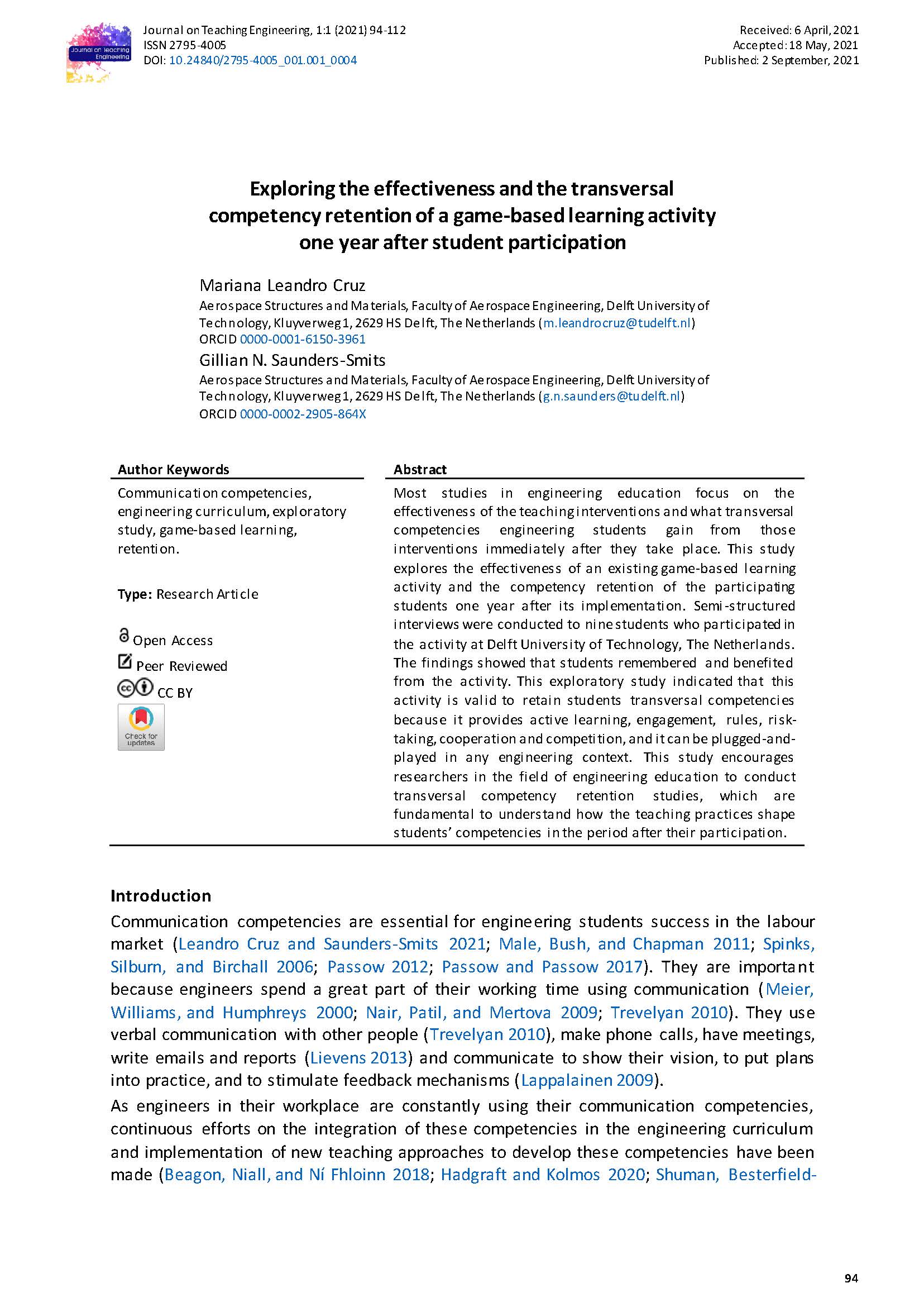Exploring the effectiveness and the transversal competency retention of a game-based learning activity one year after student participation
Main Article Content
Abstract
Most studies in engineering education focus on the effectiveness of the teaching interventions and what transversal competencies engineering students gain from those interventions immediately after they take place. This study explores the effectiveness of an existing game-based learning activity and the competency retention of the participating students one year after its implementation. Semi-structured interviews were conducted to nine students who participated in the activity at Delft University of Technology, The Netherlands. The findings showed that students remembered and benefited from the activity. This exploratory study indicated that this activity is valid to retain students transversal competencies because it provides active learning, engagement, rules, risk-taking, cooperation and competition, and it can be plugged-and-played in any engineering context. This study encourages researchers in the field of engineering education to conduct transversal competency retention studies, which are fundamental to understand how the teaching practices shape students’ competencies in the period after their participation.
Article Details

This work is licensed under a Creative Commons Attribution 4.0 International License.
References
Beagon, Ú., D. Niall, and E. Ní Fhloinn. 2018. "Problem-based learning: student perceptions of its value in developing professional skills for engineering practice". European Journal of Engineering Education 44, no. 6: 850-65. https://doi.org/10.1080/03043797.2018.1536114.
Cohen, L., L. Manion and K. Morrison. 2007. Research methods in education. Abingdon, Oxon: Routledge.
Creswell, J. W. 2009. Research design: Qualitative, quantitative, and mixed methods approaches. Thousand Oaks, CA: Sage publications.
Hadgraft, R. G., and A. Kolmos. 2020. "Emerging learning environments in engineering education". Australasian Journal of Engineering Education 25, no. 1: 3-16. https://doi.org/10.1080/22054952.2020.1713522.
Johnson, D. W., R. T. Johnson, and K. A. Smith. 1998a. "Cooperative learning returns to college - What evidence is there that it works?". Change: The Magazine of Higher Learning 30, no. 4: 26-35. https://doi.org/10.1080/00091389809602629.
Johnson, D. W., R. T. Johnson, and K. A. Smith. 1998b. Active Learning: Cooperation in the College Classroom. Edina, Minnesota: Interaction Book Co.
Kolb, D. A. 1984. Experiential learning: Experience as the source of learning and development. Englewood Cliffs, New Jersey: Prentice-Hall.
Lappalainen, P. 2009. "Communication as part of the engineering skills set". European Journal of Engineering Education 34, no. 2: 123-29. https://doi.org/10.1080/03043790902752038.
Leandro Cruz, M., S. Sá, D. Mesquita, R. M. Lima, and G. N. Saunders-Smits. 2021. "The effectiveness of an activity to practise communication competencies: A case study across five European Engineering Universities". International Journal of Mechanical Engineering Education. Article in press. https://doi.org/10.1177%2F03064190211014458.
Leandro Cruz, M., and G. N. Saunders-Smits. 2021. "Using an industry instrument to trigger the improvement of the transversal competency learning outcomes of engineering graduates". European Journal of Engineering Education. Article in press. https://doi.org/10.1080/03043797.2021.1909539.
Lievens, J. 2013. "Are communication skills important for engineers? A relevant research question for engineering students and curriculum designers". Paper presented at the 41st SEFI Conference, Leuven, Belgium, September 2013. https://www.sefi.be/proceedings/page/5/?conference=2013.
Male, S. A., M. B. Bush, and E. S. Chapman. 2011. "An Australian study of generic competencies required by engineers". European Journal of Engineering Education 36, no. 2: 151-63. https://doi.org/10.1080/03043797.2011.569703.
Meier, R. L., M. R. Williams, and M. A. Humphreys. 2000. "Refocusing our efforts: Assessing non-technical competency gaps". Journal of Engineering Education 89, no. 3: 377-85. https://doi.org/10.1002/j.2168-9830.2000.tb00539.x.
Moore, T., and J. Morton. 2017. "The myth of job readiness? Written communication, employability, and the ‘skills gap’ in higher education". Studies in Higher Education 42, no. 3: 591-609. https://doi.org/10.1080/03075079.2015.1067602.
Nair, C. S., A. Patil, and P. Mertova. 2009. "Re-engineering graduate skills - A case study". European Journal of Engineering Education 34, no. 2: 131-39. https://doi.org/10.1080/03043790902829281.
Passow, H. J. 2012. "Which ABET competencies do engineering graduates find most important in their work?". Journal of Engineering Education 101, no. 1: 95-118. https://doi.org/10.1002/j.2168-9830.2012.tb00043.x.
Passow, H. J., and C. H. Passow. 2017. "What competencies should undergraduate engineering programs emphasize? A systematic review". Journal of Engineering Education 106, no. 3: 475-526. https://doi.org/10.1002/jee.20171.
Saldaña, J. 2016. The coding manual for qualitative researchers. London, United Kingdom: SAGE publications.
Sarantakos, S. 2005. Social research. 3rd edition. Palgrave Macmillan.
Shuman, L. J., M. Besterfield-Sacre, and J. McGourty. 2005. "The ABET "professional skills" - Can they be taught? Can they be assessed?". Journal of Engineering Education 94, no. 1: 41-55. https://doi.org/10.1002/j.2168-9830.2005.tb00828.x.
Spinks, N., N. Silburn, and D. Birchall. 2006. Educating engineers for the 21st century: The industry view. UK: Henley Management College.
Terenzini, P. T., A. F. Cabrera, C. L. Colbeck, J. M. Parente, and S. A. Bjorklund. 2001. "Collaborative learning vs. lecture/discussion: Students' reported learning gains". Journal of Engineering Education 90, no. 1: 123-30. https://doi.org/10.1002/j.2168-9830.2001.tb00579.x.
Thomas, D. R. 2006. "A general inductive approach for analyzing qualitative evaluation data". American Journal of Evaluation 27, no. 2: 237-46. https://doi.org/10.1177/1098214005283748.
Trevelyan, J. 2010. "Mind the gaps: Engineering education and practice". In Proceedings of the 21st Annual Conference for the Australasian Association for Engineering Education, 383-90. AaeE.
Trevelyan, J. 2019. "Transitioning to engineering practice". European Journal of Engineering Education 44, no. 6: 821-37. https://doi.org/10.1080/03043797.2019.1681631.

